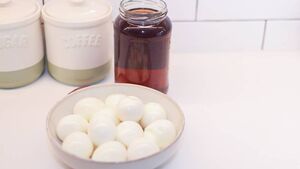Living Greener: How to preserve your eggs!

Preserved eggs
NO matter what else you have in your kitchen, you probably have eggs. If you raise your own chickens, moreover, you have a ready source of eggs, as well as fertiliser and comedy relief. Hens convert your leftovers into your next breakfast, keep your garden free of pests and mow your lawn for free. Other animals can do some of these things, but not many of us have the time, space or will to manage a suburban herd of sheep or swine, or to slaughter them in the garage. Hens, however, require little space or maintenance, and turn any home into a homestead.
They lay eggs seasonally, however, speeding up in summer and slowing in winter. You could give them more indoor light or Vitamin D supplements, but they cost money and interfere with the chickens’ natural cycle – and saving money and being all-natural are two of the most popular reasons for keeping backyard chickens in the first place.
Another way would be to collect the extra eggs in summer and preserve them through the winter. Eggs can be preserved in several ways; one, well-known to pub patrons here, is to pickle them. A typical recipe involves hard-boiling eggs and removing the shells, and then creating a pickling solution of cider vinegar, small amounts of salt, sugar, herbs and spices. Bring the mixture to the boil, then simmer for five minutes and pour over the eggs – they should keep for at least a few months.
You can also soak the eggs in a solution of sodium silicate, known as isinglass or water-glass. One popular recipe from a century ago recommended dissolving sodium silicate in boiling water, to about the consistency of a syrup (or about 1 part silicate to 3 parts water). The eggs -- as fresh as possible, and thoroughly clean -- should be immersed in the solution in such manner that every part of each egg is covered with the liquid, then removed and let dry. I also preserved eggs for several months in a paste of peat ash that I smeared on the eggs and let dry.
Perhaps the best and longest-lasting way, however, is to preserve eggs in limewater. No recipe could be simpler; take fresh raw eggs in the shell, set them gently in a jar, and pour in a simple lukewarm mix of tap water and lime powder. I’ve done this with our eggs, and they lasted for up to a year and remained edible.
“Lime” here means neither the citrus fruit nor the tree, but refers to calcium hydroxide, a white powder derived from limestone. In his 1915 monograph “Lime-water for the preservation of eggs,” Frank Shutt described a series of egg preservation experiments at an experimental farm in Ottawa, which found lime-water to be “superior to all other methods.” Shutt said that water saturates with lime at 700 parts water to one part lime, but if you use more lime than is necessary to saturate in water, the rest simply condenses out.
Eggs kept this way do come out with their whites darkened slightly, and with a faint “musty” smell like old clothes. It does not, however, have the unpleasant smell of a rotten egg – believe me, you won’t mistake one for the other. The difference can perhaps be compared to that of rehydrated milk from powder vs. fresh milk – the former is not inedible, just slightly different than expected. As Shutt puts it, nothing “can entirely arrest that ‘stale’ flavour common in all but strictly fresh laid eggs.” I’m not aware of an upper limit on how long eggs could be kept this way, but I would not recommend going longer than several months to be on the safe side. Several months, however, still allows the homesteader to continue harvesting eggs through the winter.
Shutt recommends keeping the water at a cool temperature – 40-45 degrees Fahrenheit, or five degrees Centigrade, to help the preservation. That’s the temperature of a refrigerator, but a cellar or underground storage container would probably be fine. I kept mine at room temperature during an Irish year, where the temperature ranges from freezing (32F, 0C) in winter to lukewarm (75F, 25C) in summer, with no ill effects.
With simple skills like this, we could preserve food without electricity or machines, and would be far more prepared in the event of an emergency.





